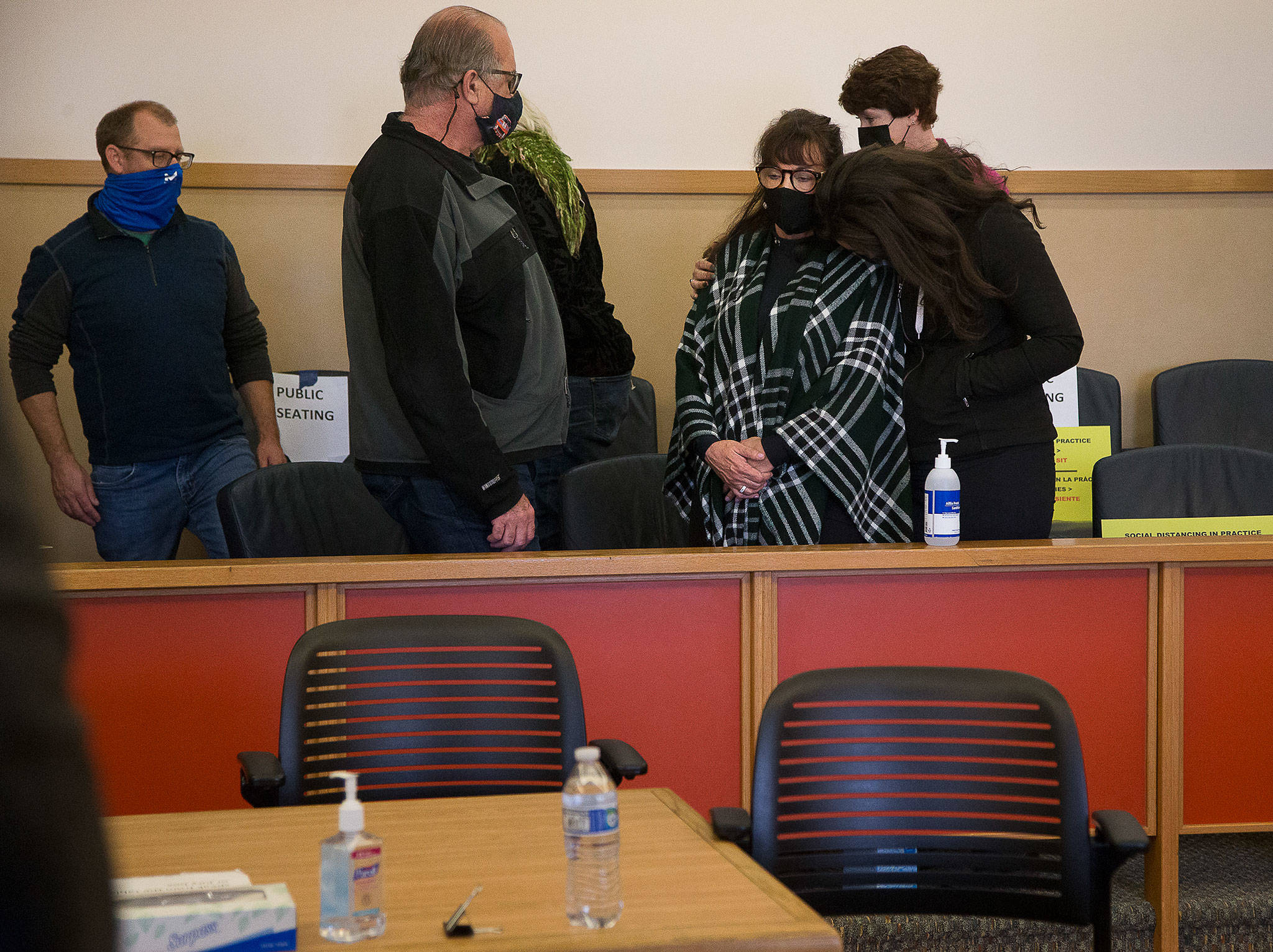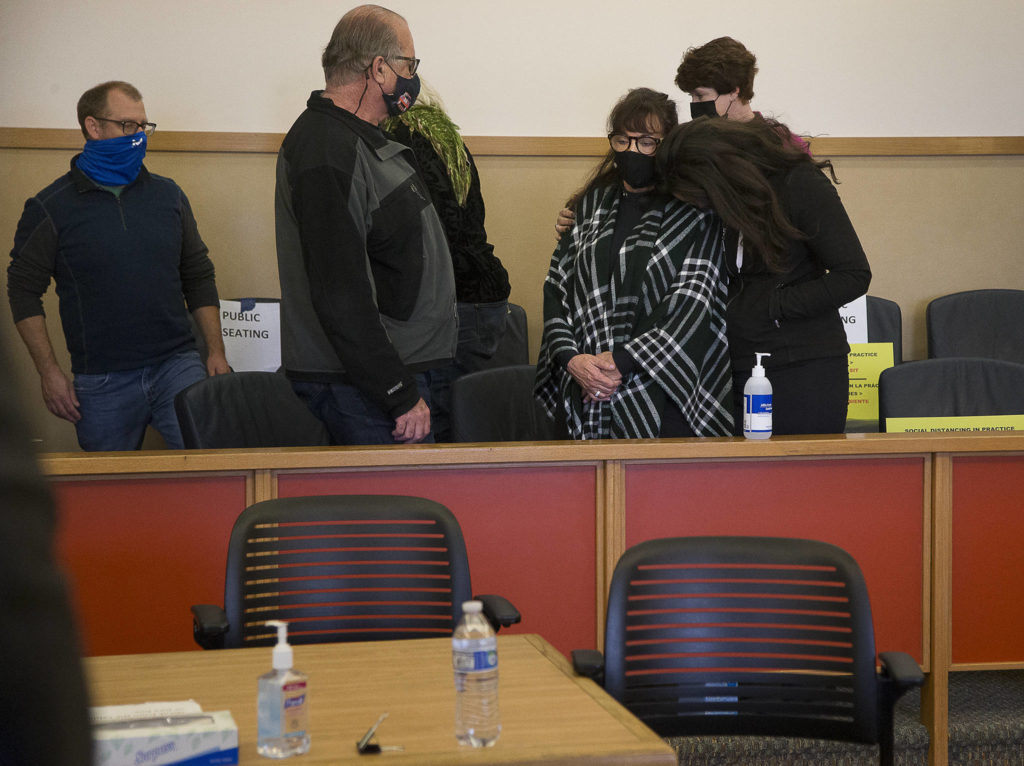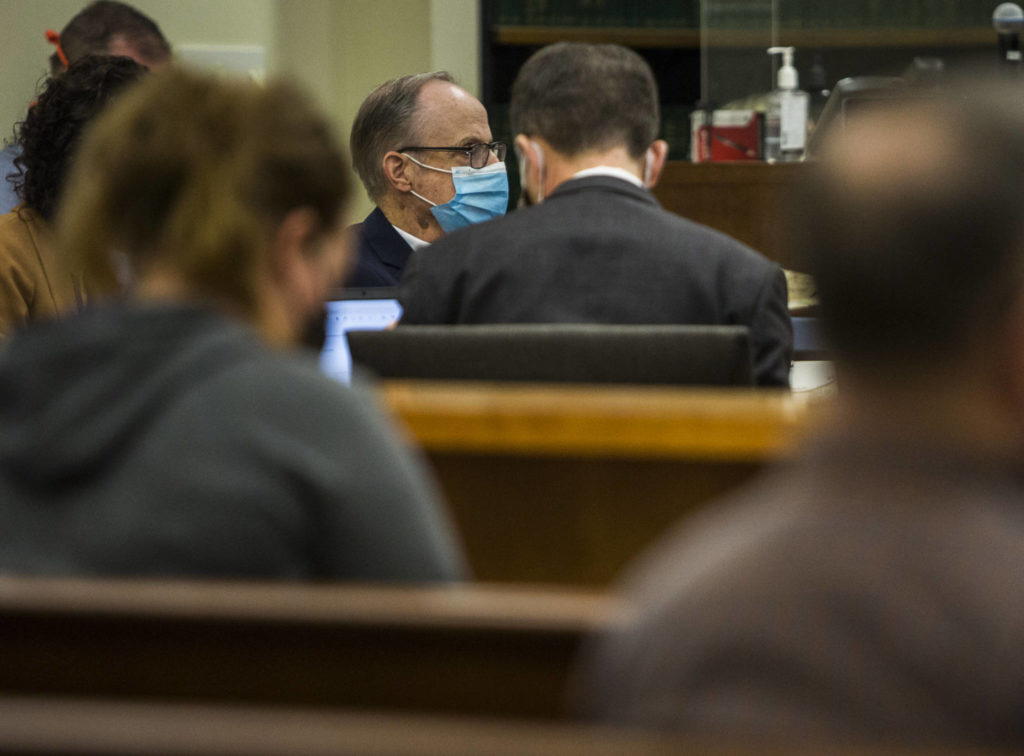EVERETT — An Edmonds man on trial for the 1972 killing of Jody Loomis died in an apparent suicide Monday morning.
Hours later, a jury found Terrence Miller, 78, guilty of first-degree murder, despite of a defense motion to dismiss the case due to the defendant’s death.
After two weeks of testimony, Miller was convicted of shooting Loomis, 20, when she was on a bike ride to see her horse, Saudi, in south Snohomish County.
A jury of seven women and five men spent Friday afternoon and Monday morning deliberating before finding Miller guilty of first-degree murder in Snohomish County Superior Court.
As they weighed the case, Miller took his own life at his home in the 15900 block of 52nd Place West, according to the Snohomish County Sheriff’s Office.
The official cause and manner of death will be determined by the county medical examiner’s office.
Miller was not behind bars because he had posted $1 million bond last year. The judge ordered him to surrender any weapons or firearms from his home. He had been effectively under house arrest, supervised by a private electronic home monitoring company.
Loomis’ surviving family members showed no outward reaction as the verdict was read Monday by Judge David Kurtz. They embraced when the court went into recess.
“I’m glad that we got to hear the verdict,” said the lead sheriff’s detective in the case, Jim Scharf. “I think that was good for the (Loomis) family.”
At the center of the trial was DNA in the form of semen recovered from a boot worn by Loomis on Aug. 23, 1972. The tiny stain went unnoticed — by the county coroner’s office, sheriff’s detectives and the FBI — until a state crime lab technician discovered it in 2008 as part of a renewed effort by the sheriff’s cold case team to solve the crime.
A somewhat degraded genetic profile was analyzed and used to rule out potential male suspects.
Then in 2018, at the request of Snohomish County sheriff’s detective Scharf, the private forensic experts at Parabon Nanolabs extracted a genetic profile that could be uploaded to public ancestry websites, the first step in an investigative technique known as forensic genealogy. An Oregon genealogist, Deb Stone, built the suspect’s family tree based on the DNA, looking for a spot where the limbs intersected. It’s the same forensic tool police in California used to track down a suspect in the Golden State Killer case.
The Snohomish County Sheriff’s Office has pioneered use of the technique, too, leading to breakthroughs in at least three long-unsolved cold case homicides.
The Loomis case was easily the oldest of the three — and it might be the oldest such case in the world, so far, to see a conviction. A handful of older cold cases have been cracked around the country with the help of forensic genealogy. In almost all of those, however, the suspect has been long dead.
The genealogist’s research led investigators to Terry Miller, a retired heavy equipment operator from Edmonds who was still alive, running a ceramics shop with his wife of over 40 years.
An undercover police task force tailed him until he threw away two stuck-together coffee cups at the Tulalip Resort Casino. The state crime lab tested saliva on the cup, and the results came back as an apparent match for DNA on the boot.
Sheriff’s detectives arrested Miller in April 2019. He was charged with first-degree murder. He awaited trial for over a year. His defense maintained his innocence in closing arguments Friday.
Miller and Loomis did not know each other.
That afternoon in 1972, Loomis took off on a white 10-speed bicycle headed for a stable on Strumme Road. A girl working at a family fruit stand noticed her — in a blouse and “waffle-stomper” boots — pausing a while at the intersection of Bothell Everett Highway and Penny Creek Road, what’s now a much busier intersection in the heart of Mill Creek.
Loomis disappeared out of view as she pedaled east. She was near the midpoint of her 6-mile ride. Around the corner, a couple turned a car up a dirt track off Penny Creek Road, and a few hundred feet up the secluded wooded drive, a tree blocked their path.
There they discovered Loomis at about 5:30 p.m., dying from a .22-caliber gunshot wound to the head. She was unable to speak. She was pronounced dead on arrival at an Edmonds hospital.
Miller did not testify in the trial.
In closing arguments, prosecutors Craig Matheson and Bob Langbehn repeatedly pointed to the key evidence against Miller: the DNA, inexplicably on a boot Loomis had borrowed from her sister, age 12.
In rendering a verdict, jurors appeared to reject arguments by the defense that significant evidence was mishandled and contaminated over the years.
In her closing argument last week, defense attorney Laura Martin said the mere presence of DNA did not prove Miller was guilty of murder and that detectives rushed to judgment and arrested an innocent man.
“That’s what happens when you try to smash together pieces of a puzzle that simply don’t fit,” she said.
Miller himself told his wife and at least one friend that he believed the DNA evidence against him was too strong and it would lead to his conviction and imprisonment, according to testimony near the end of the trial.
If Miller had been in court Monday, he likely would have been taken to jail to await sentencing. It’s unclear what’s next for the case, since it is incredibly rare for a defendant to die in the hours before a jury returns a verdict. The defense argued against hearing the jury’s decision at all.
“Any fines that the court could impose for purposes of sentencing would simply saddle the (Miller) estate with the fees, and his family, as well as his wife,” Martin argued. “There would be frankly no public benefit in the court actually proceeding to take the verdict in this case, because you cannot sentence Mr. Miller.”
Matheson responded that he “could not disagree any more vehemently,” because the Loomis family deserved answers they have waited to hear for 48 years.
The judge sided with the prosecution.
Attorneys have set a follow-up hearing for Dec. 17.
“I think we should put this to bed properly,” Matheson said.
Last year, as attorneys debated how high Miller’s bail ought to be, prosecutors argued the defendant essentially faced a life sentence if found guilty — giving him a reason to flee, or perhaps to harm himself.
“We want our day in court,” Matheson said last year.
The defendant did not miss a court date until Monday.
The 911 call reporting a suicide at Miller’s home came just before 10 a.m.
Three hours later, the jury found him guilty.
Caleb Hutton: 425-339-3454; chutton@heraldnet.com. Twitter: @snocaleb.
Talk to us
> Give us your news tips.
> Send us a letter to the editor.
> More Herald contact information.




























